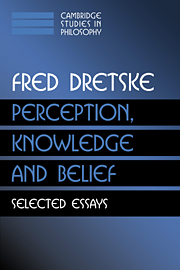Book contents
- Frontmatter
- Contents
- Preface
- Part One Knowledge
- Part Two Perception and Experience
- Part Three Thought and Intentionality
- 11 Putting Information to Work
- 12 If You Can't Make One, You Don't Know How It Works
- 13 The Nature of Thought
- 14 Norms, History, and the Constitution of the Mental
- 15 Minds, Machines, and Money: What Really Explains Behavior
- Index
14 - Norms, History, and the Constitution of the Mental
Published online by Cambridge University Press: 19 December 2009
- Frontmatter
- Contents
- Preface
- Part One Knowledge
- Part Two Perception and Experience
- Part Three Thought and Intentionality
- 11 Putting Information to Work
- 12 If You Can't Make One, You Don't Know How It Works
- 13 The Nature of Thought
- 14 Norms, History, and the Constitution of the Mental
- 15 Minds, Machines, and Money: What Really Explains Behavior
- Index
Summary
No one doubts that the mind evolved. What would be surprising is if it had to evolve – if the mind not only had a history, but a history essential to its very existence.
Surprising though it is, some people think this is so. Of those who think it so, some think it because they discern, or think they discern, a normative quality to mental affairs, a way mental states and activities (qua mental) are supposed to be, that can be understood only by conceiving of them as products of a historical process. Without a process like natural selection or learning, processes capable of grounding a difference between how things are and how they are supposed to be, there is nothing to provide the requisite contrast with existing fact, the sort of contrast we normally invoke by speaking of how things should be or behave. Objects that materialize wholly by accident, for instance, have, at the first moment of their existence (before acquiring an appropriate history), no purpose, no way they are supposed to be or behave. Such objects (so it is said) can harbor no meaning or content – hence, no capacity for reason, judgment, or experience – states and activities that presuppose norms. History is to minds what it is to fossils. Without the right history, there aren't any.
Since the arguments for this view are not entirely convincing – even to someone like me who accepts their conclusion – and the consequences of the view, I keep being told, are preposterous, I take this occasion to reexamine the matter.
- Type
- Chapter
- Information
- Perception, Knowledge and BeliefSelected Essays, pp. 242 - 258Publisher: Cambridge University PressPrint publication year: 2000
- 12
- Cited by



